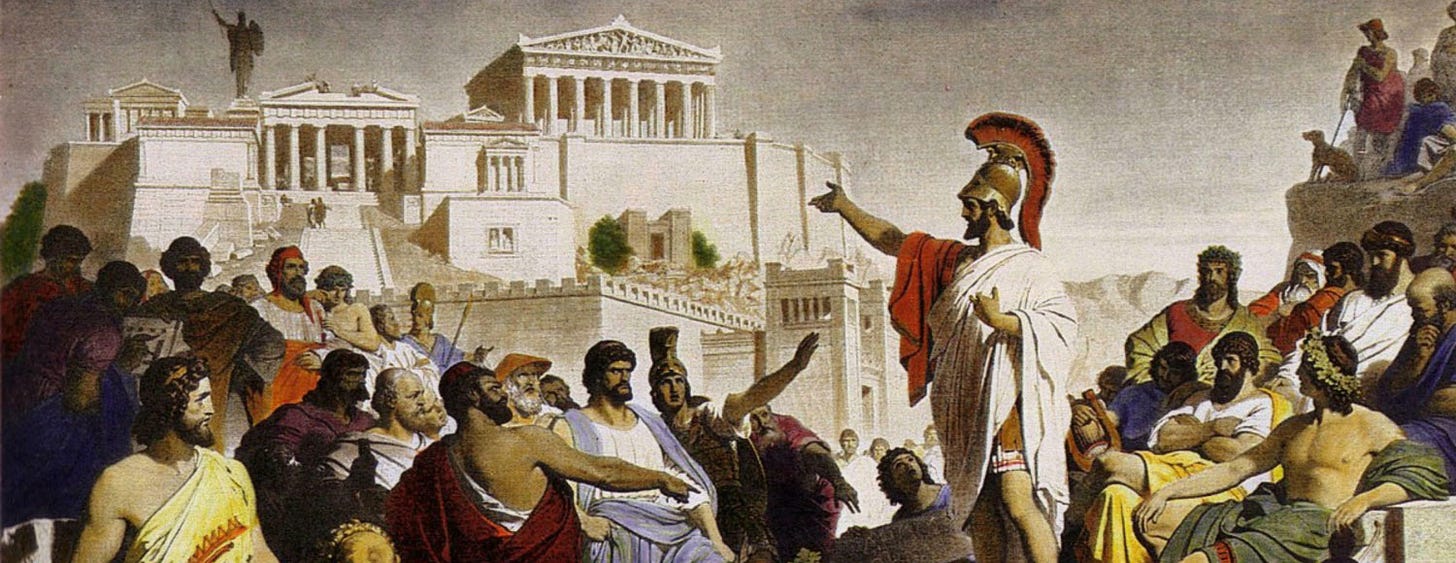*To read Parts 1 and 2 of this series, click here and here.
We’ve come a long way, Dante. The lira recently hit 18,000 L.L. per USD. Who knows how many more circles of Hell we have left to travel through?
It shouldn’t be this hard, but it is. Why is that? Why has absolutely nothing changed?
Welcome, dear reader, to the most stable and consistent of all forms of government—oligarchy.
Our Oligarchy:
“…an oligarchy does not function like a normal dictatorship. Power is decentralized, and you get something resembling the bystander effect. The more power is spread out, the less responsible each individual is for the tragedy happening right in front of them. They can always — always — point to the person across from them, who has just as much power as they do, and point the finger of blame onto others.”
As we've outlined previously, oligarchy is completely natural. Give everyone today $100 and see how quickly inequality reasserts itself, that a natural few will turn those $100—through legal or illegal means—into $10,000.
There are two basic explanations for the stability of oligarchy.
The first is its incredible flexibility in the face of crises. It is extremely difficult to pin down blame for failure on a single entity. There's literally too much blame to go around, as the quote suggests. The diffusion of responsibility has a secondary effect of diffusing the passion of the subject population.
In each of the examples of the Arab Spring, there was a general population in open disobedience to the one-party state. And so all political passion was directed against the Party leader.
But with oligarchy comes a decentralized network. The area of attack is too broad, just as in a military conflict, and so the attacking forces are stretched too thin to cause any effective damage. There is no single point of contact, the force is as diffuse as punching a sack of dough.
This is what marching down Martyrs Square looks like, as opposed to marching down Tahrir Square.
Another reason for their stability is that oligarchies, unlike one-party states, are disunited. There is constant drama, competing agendas, and shifting alliances. There is no script handed down from Papa Stalin to keep them in tow. Therefore, it is extremely easy for parties within the oligarchy to support many of the revolutionary features. Whether it is anger at corruption or alignment on certain policies.
And because mass revolutions often lack coherent leadership—normally a positive element which makes it difficult for authorities to target and destroy—this also leaves it vulnerable to infiltration and being led by discontent elites breaking away from the oligarchy.
The line between friend and enemy within the revolutionary camp is blurred, and so no effective political action is possible.
You might think that this is irrelevant, that our oligarchs as a class make them an obvious target for political action by the people. However, you’d be mistaken. The oligarchs do exist as a separate ruling class, but this is the benefit of a disunited one, with a long history of armed conflict. Sectarian identities between oligarchs makes any action against one of them by members of a different sect a sectarian attack on the whole group. Thus, mitigating the effects of popular discontent.
The flexibility of oligarchy and disunited parties with competing agendas also means that reforms for systemic change are championed by certain parties, proposed to consensus-making institutions, and then get stuck in the process and completely abandoned.
If most people are happy under democracy, and one person is happy under autocracy, then no one is happy under oligarchy—least of all the oligarchs themselves. This is the reality of management under unanimous consensus. No one is happy, because no one is satisfied with their share and all positive visions for change are politically impossible.
Thus, the reality of oligarchical government is not just a body in homeostasis, but a body in homeostasis irresponsive to steroids.
You would think a record-breaking economic depression would cause at least some changes, but it has not. Not a single bank has been liquidated. Not a single deposit has received a haircut. I'm sure not a single civil servant was fired. Everyone is aware that all three of those steps needed to be taken. That the whole country deserves to go bust.
Yet we live on, frozen in Hell.
But oligarchy is natural, and many governments today can be classified as such without experiencing this level of absolute and total disaster. The United States in 1789, when the Constitution became law, was an oligarchy. But it was an oligarchy composed of highly intelligent, practical, and talented landowners under a meritocratic economy.
Nothing like this exists in Lebanon today. That our oligarchs are liars and thieves is a given. But they're also extremely low-quality people. Ill-educated, brutish, short-tempered, and shallow to the core. A typical warlord-chieftain. They're certainly not sending us their best.
As mentioned in Part 2, our oligarchs are not even our managers. Banque du Liban (BDL) is filled with extremely bright, well-educated, mentally well-adjusted people. It is the financial and political regime they are trying to uphold that is the problem. These people would make an excellent management team under a different regime with a different incentive structure. All the intelligence is there, and none of the wisdom.
Our Countrymen:
Now that we have a better understanding of oligarchy, we have to focus, briefly, on the other side of this oligarchy—we, the subjects. Why do people obey this regime?
To get the easy answers out of the way, the state is still the 300lbs gorilla in the room. It is well organized and has the most guns. Hezbollah might as well be a state within a state, since it is both better organized and heavily armed, but it still represents a fraction of a single sect and not the nation.
There are no other "parallel states" competing for the whole nation and so it has a practical monopoly on authority.
The other easy answer is the status quo bias inherent to the whole human species. This, in fact, is a positive evolutionary aspect of social systems. Social conservatism is widespread because change is destabilizing and high risk. Nothing gets accomplished in highly unpredictable, unsafe environments, especially business. The Devil you know is better than the Devil you don't, precisely for this reason of unpredictability.
And so, we come to the third reason for why people obey.
The fact is, no matter how much either Libertarians or Socialists may wish otherwise, Lebanon is a feudal society, has always been a feudal society, and here's the kicker—has no reason to be anything else. Why should it pretend to be something it is not?
To quote the reactionary blogger, Spandrell:
"Feudalism is a very natural form of government. It's basically transposing the hierarchy of a conquering army into peacetime. China started like that, 1046 BC. The German tribes that conquered Western Rome also run like that. The king at war becomes the king at peace. The generals become counts. The colonels become earls. Everyone gets a peace of land, a set of rules of behavior, a set of duties of fealty.
It works pretty well at keeping loyalty. It's not perfect, of course, after generations pass, the original ties of loyalty between army buddies aren't quite the same. But it worked reasonably well. Feudalism in both China and Europe lasted about 1,000 years. The problem with feudalism is that it's really hard to get anything done. It's hard to raise taxes, it's hard to get anything built. Everybody is very zealous about their inherited status and they won't tolerate the smallest change."
While not a perfect analogy with Lebanon, this is the essential truth. Our civil war established a new regime, with its warlords at the helm, formalized in the power-sharing agreement at Taif. They got their land, cabinet positions, and very cushy salaries and benefits.
Now we come to the heart of the matter. From Part One:
"Every political party secures loyalty through its patronage networks. It is patronage and corruption that kept everything running smoothly in Lebanon. It has happened in my family. It has probably happened in yours too. My cousin has probably gotten a job this way. Your cousin probably has too.
The problem today is that the machine is broken, because the machine relied on giving people money, security, and status. And now it is broken beyond repair."
The third basis for obedience in Lebanon has always been patronage. It is not enough for a warlord to have an army. What is a lord without his peasants?
The Patron-Client dynamic is the building block for any and all political power. How many sheep do you shepherd? How far are they willing to go for you? When you say jump, do they ask how high?
In multiethnic and diverse societies, the Patron-Client relationship is especially pronounced. You exist in a competition for resources among other distinct and untrustworthy groups. In-group preference, like status quo bias, is another positive evolutionary adaptation. And the leadership of an in-group has a natural incentive to reward it's most loyal adherents for their service in this competition.
Because man cannot exist as a fully independent unit, and requires the service of others to provide resources, he must instinctively turn to the people he can trust most, his in-group.
This is the reality of the Client, in competition for resources. It is both easier and safer for the Client to profess his loyalty to the Patron, than to remain isolated and compete among the members of other groups. A simple statement of loyalty and the expectation that you will perform a certain act for the Patron in the future (say, a vote) is all that is necessary for a Client to access the resources of the Patron.
The inequality is inescapable. Patrons will always control the majority of resources and there will always be more Clients than Patrons.
Come on, who wouldn't want an easy job stamping passports at the Interior Ministry for 5 hours a day with full benefits? Who wouldn't suck Nabih Berri's d*ck for lifetime employment at Electricity du Liban (EDL), pretend fix a few copper wires, and retire at the age of 55?
But, if we look around, we see that while Clients may be a majority, not everyone is a Client. Not everyone is that eager to suck Nabih Berri's d*ck.
Remember, Dante, a man is only as loyal as his options. The middle class in Lebanon, politically speaking, is one of the most disloyal elements of the system. There is a reason why most Socialists, Libertarians, and Liberals—across all countries—are historically middle class. Doctors, teachers, lawyers, entrepreneurs, and engineers have always been a politically disconnected bunch. Because they have economic options outside the oligarchical Patron-Client structure.
If this is the case, then the middle class exists as an independent source of political power. So what have they been doing with this power? Why has the middle class never taken over?
Two reasons. First, because the middle class, broadly speaking, do not act as an organized collective. They have no reason to, given their economic options. Politically, they are out for themselves and make unreliable Clients at best. They give terrible fellatio, politically speaking.
Second, the nature of their training and economic potential mean that, within a few years of graduating university, half of them will leave the country anyway. There is no need for the Oligarchs to service them. And so, the political structure of Lebanon represents the most common historical structure of class conflict, the High-Low vs. Middle.
Being the most economically productive group (excluding teachers), the middle class has no Patron to protect them. And so the natural incentive of this structure is to squeeze them harder from both sides. Make business impossible. Write more regulations. Demand some protection money, mafia-style. Give a Client-bureaucrat $100 to grease the wheels and get that paperwork finished.
They get fucked, essentially. And how will they fight back? By collectivizing? Not a chance in Hell, I'm afraid.
They are out for themselves, after all. Their only refuge is exit or becoming a shitty Client. And this is the case, most often. No one wishes to be bothered, and so you go along with it, for the sake of ease and minimal stress. They don't need you to be a hooker, they just need your compliance.
Our Goal:
As discussed in Part 2, we live under a regime of ruling and non-ruling elites. This is the norm. And our principal aim is regime change, not revolution.
However, if we are to give the revolutionaries their due, they are correct on this one point. To paraphrase Lenin,
I became a revolutionary when I realized that the goal was not to control the machine, but to smash the machine and replace it.
Lenin is correct. The machine as it stands has no justification. The Presidency, cabinet, ministries, and Parliament have no reason to exist. We do not need this regime, but there will still be a state to run after this regime ceases to exist.
And so, where do we go from here?
Remember, there is nothing new under the sun. Regimes come and go, but Aristotle is eternal. And he outlined the three classical forms of government: democracy, oligarchy, and autocracy.
The rule of the many. The rule of the few. And the rule of one. If we currently exist in an oligarchy, it follows then there are only two directions of travel. Up or down.
What will it be, Dante? The Crowd or the Master?
But wait. What about having a new oligarchy, you say? Why not find some new overlords? While not impossible, it is extremely more unlikely than the other two possibilities. Because, even if all individuals within the oligarchy can be replaced, it would have almost no impact on its structure. Sectarianism will still be sectarianism, and people will follow available incentives as they always have. They will conspire, cut out their share of the pie, distribute some benefits to their Client-followers, and continue to avoid taking responsibility. We do not want a new oligarchy; we want a reset.
There are many reasons why I believe democracy would not be the preferable option. Hell, whole books have been written about the failure of liberal democracies. I could speak about the fact that democracy, like feudalism, cannot escape the basic Patron-Client dynamic. That votes are “earned” through the promise of future resources to Clients from their generous Patrons. However, for the sake of brevity, I will focus on what I believe to be democracy’s most evil, depraved aspect: Never-ending and total psychological war on "the people."
Of course, the phrase "total psychological warfare" would never be used by liberal democrats themselves to describe their behavior. They have a much more neutral term, the management of public opinion. Just as they have their Peace and Global Governance degrees from university. "Peace" and "Global Governance" after passing through the Orwell machine translate into "Subjugation" and "How to take over and rule the world".
The management of public opinion is the inevitable result of taking democracy to its logical conclusion. If "the people" are the source of power and legitimacy in a system, then any ruling elite has an interest in controlling the mind of the public. The ruling elite will require, not just that you follow the law and pay your taxes, but that you love your rulers, and that your love and obedience is a signal of their legitimacy.
The natural incentive of any politician is then to: 1) found a cult—group of Clients—as a base of strong and dependable support, and 2) nudge public opinion in your direction through the use of psychology, persuasion, and public relations. The end result is to change your thoughts and/or beliefs in order to align them with the values and goals of the regime.
The game of democracy is, not just to compete for your vote, but to compete for your mind. This is the trade off, for the illusion that "you" as a member of "the people" are the source of power and relevance.
This system as illustrated does not describe Lebanon, because Lebanon is not a democracy. While every political party has its own media and propaganda network, no one is trying too hard to compete for your mind, even as a Client! Your vote is basically irrelevant and counted on sectarian lines anyway.
No party in Lebanon has it as their mission for you to believe in lies. The Party of God might come the closest, but this is a result of war propaganda and foreign funding coming from an ideological regime in Iran. But you could still get away with a lot, even in public.
The fact is every breath I've taken in that beautiful shithole was brimming with freedom. It does not matter whether you have Communist thoughts. Or Libertarian thoughts. Or even Reactionary thoughts. You are free, because you have no power or relevance to the regime. No one needs you to love Big Brother, again, all they ask is your compliance.
And so, having eliminated our choice of both Democracy and Oligarchy, that leaves us with one last option. What is the positive case for Autocracy, anyway?
Tune in for the next post to find out. Subscribe now.






